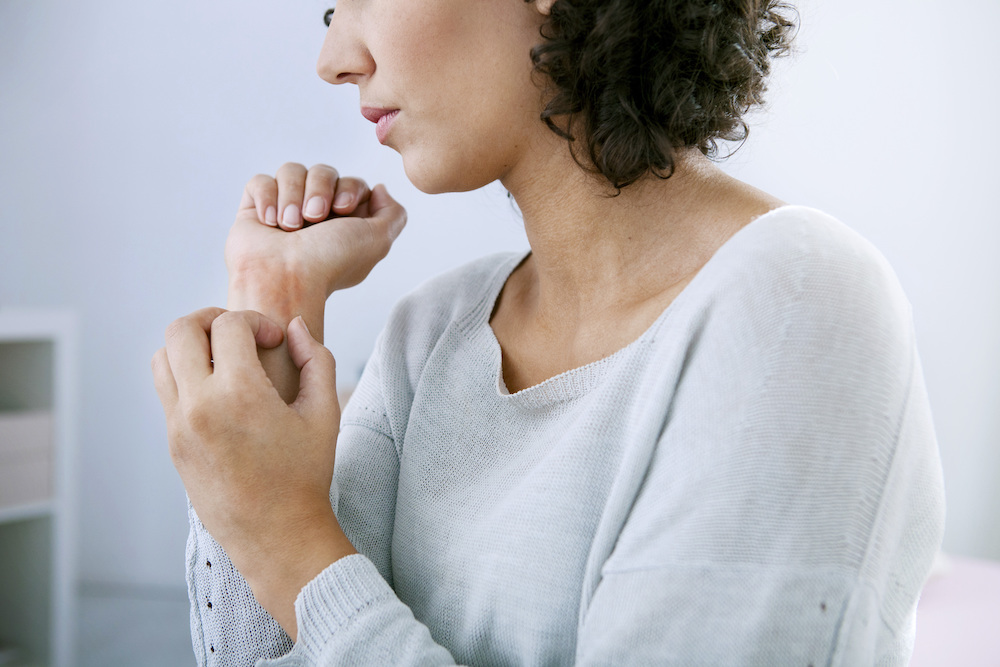3 Tips for Treating Your Eczema

If you are one of the over 31 million Americans who have a form of eczema, you know that the condition can be uncomfortable and even downright painful. Many people don’t realize that there are 7 different types of eczema and that treatments can vary for each. But no matter if you have a mild or severe case, you should seek the help of a dermatologist to get an accurate diagnosis and begin a treatment plan.
What is eczema?
Eczema is an umbrella term that includes 7 different conditions that result in itchy, inflamed skin. Cases can range from mild itching to severe oozing and swelling, and the symptoms can vary widely from person to person. It is important to understand that eczema is not a condition that can be passed on to others through touch. However, there is evidence that supports that eczema is due in part to genetics. It can also be triggered by environmental conditions such as allergens like dairy or shellfish, and irritants such as cold or dry weather and certain chemicals.
The different types of eczema include:
- Atopic Dermatitis
- Contact Dermatitis
- Dyshidrotic Eczema
- Neurodermatitis
- Nummular Eczema
- Seborrheic Dermatitis
- Stasis Dermatitis
What are the symptoms of eczema?
It can sometimes be difficult to determine if you have eczema because the condition can look different for different people. Eczema is usually characterized by itchy skin and can progress to severe itchiness that can become inflamed. When the itching becomes severe, it has the tendency to bleed which can make the condition worse and put you at risk for an infection.
People who have eczema may have symptoms such as itchiness, dry skin, overly sensitive skin, red and inflamed skin, rough skin, scaly patches and swelling. For people who may have a propensity to develop eczema, their symptoms could worsen in cold or dry weather or after eating certain foods.
How Do You Treat Eczema
While there is no cure for eczema, there are a number of treatments that can help reduce the symptoms and increase your overall comfort. Here are some treatment tips that may help you control your eczema. If you think you might have eczema, contact your dermatologist right away. Your doctor can look at the affected area, learn more about your symptoms and triggers and come up with an accurate diagnosis and treatment plan.
Tip 1: Wash your skin with care.
Many soaps contain harsh ingredients that can strip your skin of its natural oils. They can also contain irritants such as fragrances that can cause an eczema flare up. Choose a soap that is hypoallergenic, free from fragrances and preservatives and has a neutral pH. Glycerin soaps are another good option.
Take care to avoid over washing your skin. Try using soap only on the parts of your body that require it, rather than all over. Avoid using very hot water and taking long showers. Instead, shorter showers using lukewarm water will prevent over drying and inflammation.
Tip 2: Moisturize with the right product.
Moisturized skin is healthy skin. Even if you are experiencing an eczema flare up, you do not want to skip this step in your skincare routine. When choosing a product, be sure to find one that is fragrance free and hypoallergenic. Try to moisturize within 3 minutes of bathing to seal in the moisture. Keeping your skin hydrated can prevent painful cracks and soothe itchiness.
Tip 3: Be careful when you scratch an itch.
People with eczema who have very itchy skin are prone to scratching their skin, causing infections. To try to prevent abrasions, keep your finger nails short. Use cold water to reduce itching. This can be in the form of a spray bottle or a cold, wet wrap. Avoid overheating while exercising or while outdoors. Finally, avoid fabrics that could cause irritation or itchiness, such as wool.
Leading Eczema Dermatologist Atlanta
If you have red, itchy and scaly skin, you might have eczema. Contact the leading eczema dermatologist in Atlanta and College Park at Buckhead Dermatology today. Dr. Straughn will consult with you to learn more about your symptoms, identify what might be triggering the condition and help you get on an effective treatment plan right away.
